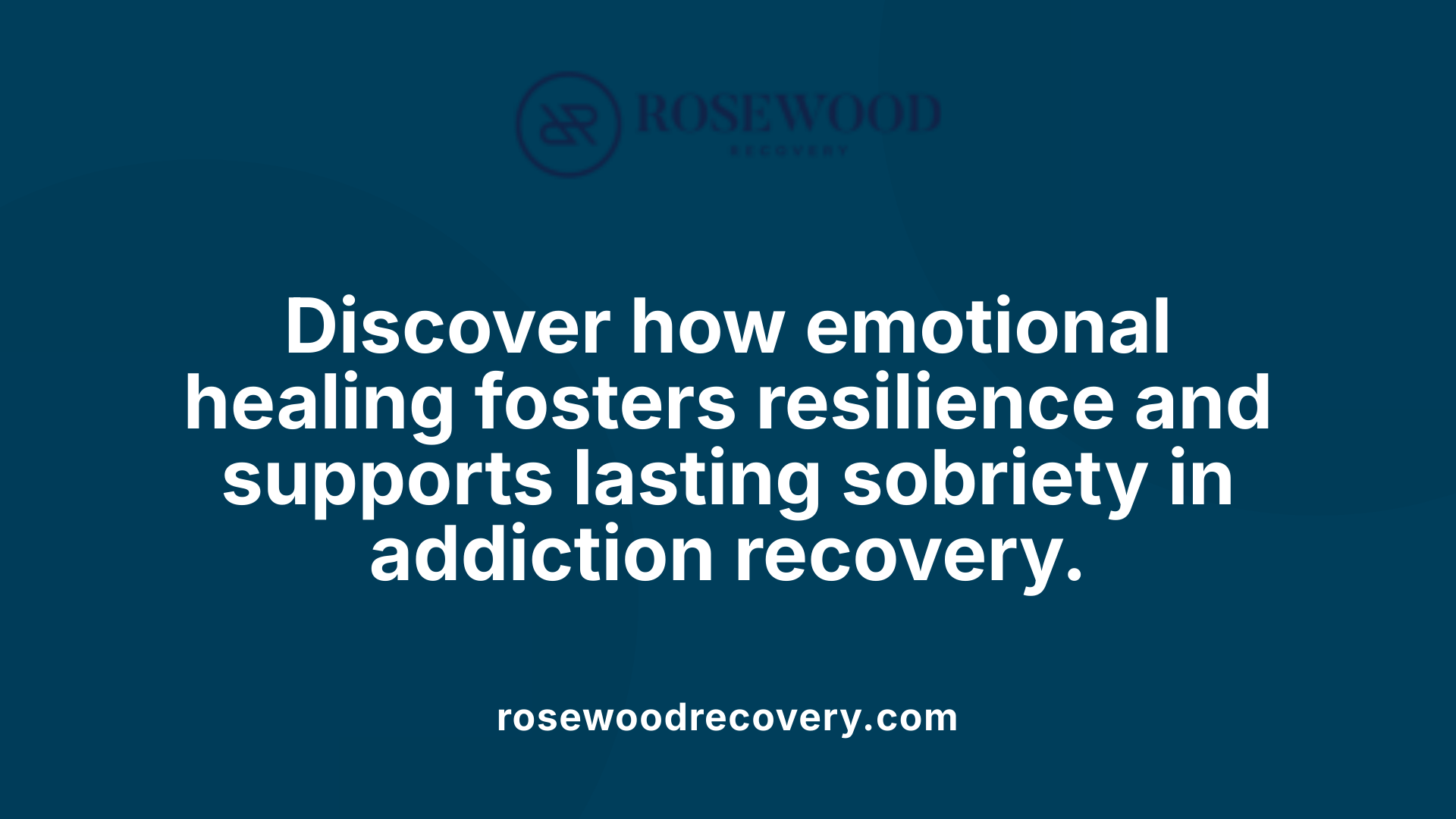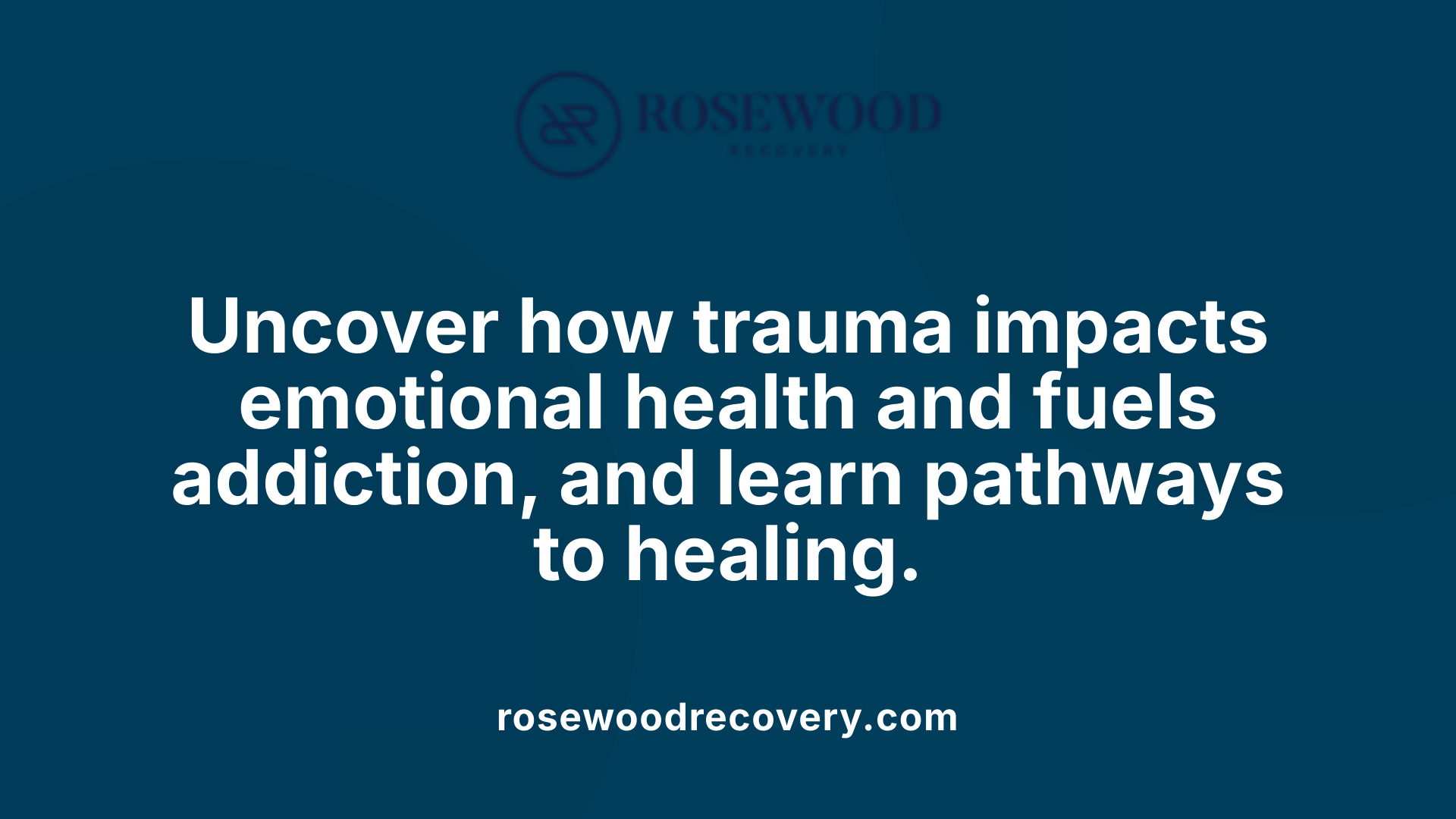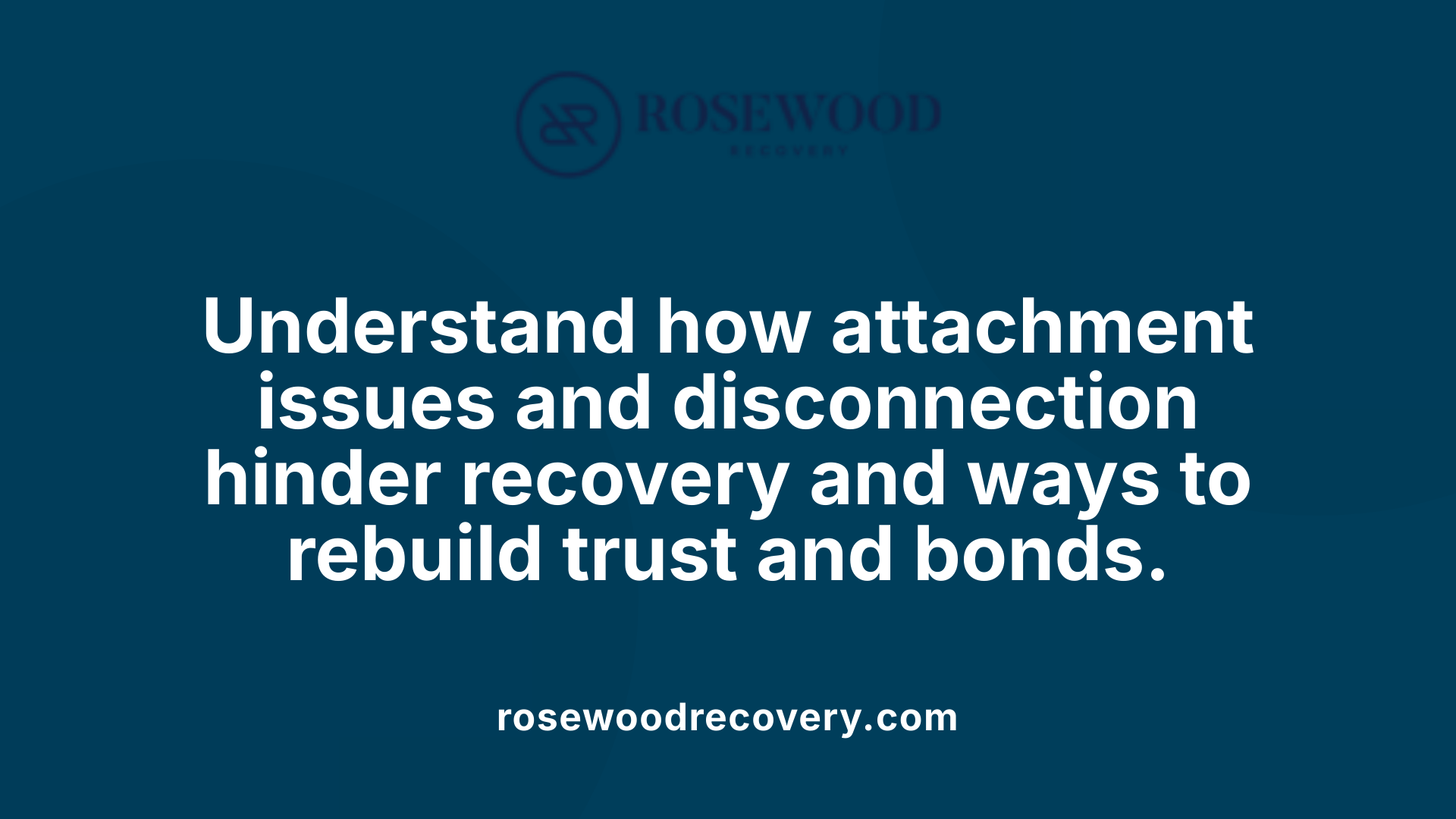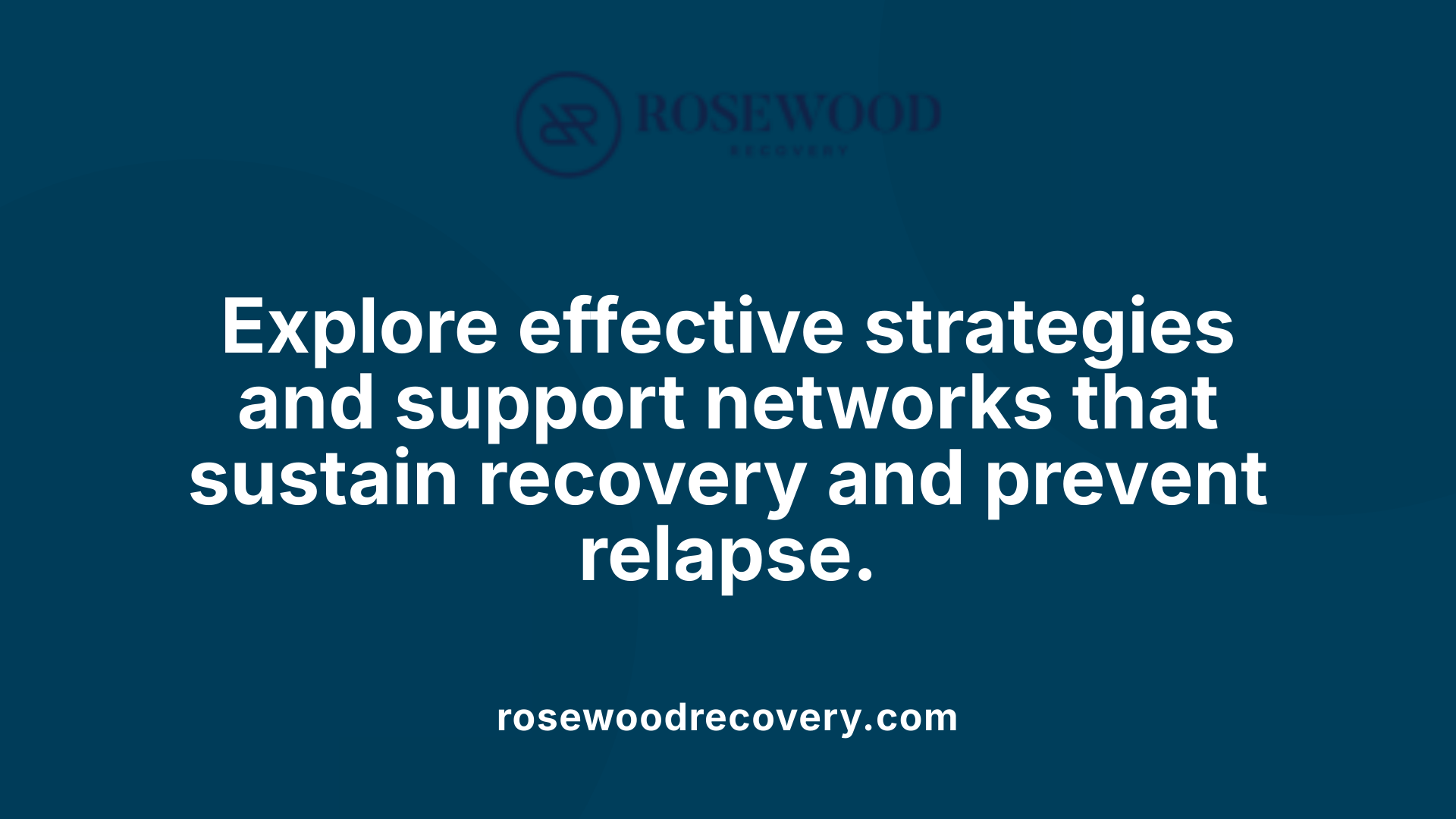The Complex Web of Trauma, Emotion, and Substance Use
Recovery from substance use disorder is not merely about abstinence; it involves addressing the emotional and psychological roots that often underpin addictive behaviors. A layered approach to emotional healing recognizes the multifaceted relationship between trauma, attachment, and emotional health, offering a comprehensive pathway to sustained recovery.
The Crucial Role of Emotional Healing in Substance Use Treatment

What is the role of emotional healing in substance use treatment?
Emotional healing is fundamental in substance use treatment because it tackles the emotional roots that often lead to addiction. Many individuals turn to substances like alcohol, opioids, or stimulants to numb unresolved pain from trauma, anxiety, depression, or overwhelming life events.
Addressing these underlying issues allows individuals to understand their emotional triggers and develop healthier ways to cope. Therapy plays a vital part here, especially trauma-focused approaches such as EMDR or TF-CBT, which help reframe negative experiences and reduce emotional distress.
Rebuilding emotional stability involves establishing new coping strategies that do not depend on substances. This includes learning mindfulness, emotional regulation, and resilience techniques through both individual and group therapies. Support groups and community connections further bolster emotional bonds, fostering a sense of belonging and reducing feelings of loneliness.
Managing triggers like anger, guilt, or fear is crucial, as these are often tied to past trauma. By recognizing and coping with these emotions, individuals can prevent relapse and promote sustained recovery.
Overall, integrating emotional healing into addiction treatment not only addresses the symptoms but also heals the emotional wounds that fuel substance use. This comprehensive approach enhances resilience, supports mental wellness, and lays a solid foundation for long-term sobriety.
Understanding the Connection Between Trauma, Emotional Well-being, and Addiction Recovery

How are trauma and emotional well-being connected to addiction recovery?
Trauma and emotional health are deeply intertwined with the process of overcoming addiction. Unresolved traumatic experiences—such as childhood abuse, neglect, or traumatic events like natural disasters or violence—can leave lasting emotional scars. These scars often manifest as anxiety, depression, PTSD, and emotional numbness, which can make individuals vulnerable to substance use as a way to cope.
People often turn to alcohol, opioids, stimulants, or other substances to numb overwhelming feelings or escape distressing memories that stem from trauma. This reliance creates a cycle where trauma fuels substance use, and ongoing substance use can lead to additional traumatic experiences, complicating recovery.
Addressing trauma is crucial because it helps break this cycle. Trauma-informed care approaches emphasize understanding the person’s background, creating a safe environment, and building trust. Therapies such as Eye Movement Desensitization and Reprocessing (EMDR) and Cognitive Behavioral Therapy (CBT) help individuals process traumatic memories, reduce emotional triggers, and develop healthier coping mechanisms.
Effective addiction recovery also involves managing co-occurring mental health issues like PTSD, depression, or anxiety. By treating trauma alongside addiction, individuals can rebuild their emotional resilience, restore self-worth, and develop sustainable strategies for long-term well-being.
In summary, healing trauma is an essential component of addiction recovery. Integrating trauma-focused therapies and holistic approaches fosters a comprehensive path to emotional stability and sustained sobriety.
The Influence of Attachment and Disconnection on Substance Use and Recovery

What influence do attachment issues and emotional disconnection have on substance use and recovery?
Attachment patterns and emotional disconnection significantly impact both the development of addiction and the journey of recovery. People with insecure attachment styles—especially disorganized and fearful–avoidant patterns—are more vulnerable to turning to substances as a way to manage emotional pain, trauma, and relational struggles.
These attachment issues impair a person's ability to regulate emotions and trust others, leading to difficulties in forming and maintaining healthy relationships. As a result, substances like alcohol, opioids, or stimulants often become maladaptive coping tools, helping individuals numb distressing feelings or escape overwhelming memories.
Moreover, substance use itself can further damage attachment security by creating social isolation, mistrust, and emotional disconnection over time. This cycle deepens emotional wounds, making sustained recovery more challenging.
Addressing attachment disruptions in therapy is crucial. Approaches such as mentalization-based therapy and relational reconnecting strategies focus on fostering trust, emotional awareness, and secure attachments. These interventions help individuals rebuild emotional security and resilience, which are vital for long-term recovery.
In summary, attachment difficulties and emotional disconnection can act as barriers to overcoming addiction. Recognizing and healing these relational wounds through trauma-informed therapies is essential to breaking the cycle and supporting lasting recovery.
Therapeutic Approaches Facilitating Emotional Healing – Focus on Psychodrama and Creative Therapies

What therapeutic approaches, such as psychodrama, are used to facilitate emotional healing in substance use treatment?
In the journey toward recovery from addiction, addressing emotional wounds is vital. Various therapeutic approaches, including psychodrama, expressive arts therapy, and group therapy, play a crucial role in fostering emotional healing. Psychodrama involves acting out past experiences and conflicts, allowing individuals to process unresolved trauma in a safe environment. This experiential technique helps uncover hidden feelings, promotes emotional expression, and enhances self-awareness.
Expressive arts therapy, which integrates techniques like painting, music, dance, and drama, offers another powerful avenue for emotional processing. Engaging in creative activities enables clients to explore difficult emotions indirectly, reducing resistance and promoting catharsis. Group therapy further complements these methods by offering social support and shared understanding, making individuals feel less isolated in their struggles.
Complementing these approaches, trauma-informed therapies such as Eye Movement Desensitization and Reprocessing (EMDR) and Dialectical Behavior Therapy (DBT) help clients reframe traumatic memories and develop emotional regulation skills. Mindfulness practices can also be incorporated to increase present-moment awareness and reduce emotional reactivity.
These experiential therapies are designed not only to facilitate emotional expression but also to bolster mental health and support sobriety. By addressing underlying emotional wounds through creative and interactive modalities, individuals can rebuild their self-esteem, develop healthier coping mechanisms, and maintain long-term recovery.
Below is an overview of some prominent therapeutic methods used in addiction treatment:
| Therapy Type | Techniques | Focus Area |
|---|---|---|
| Psychodrama | Role-playing, enactment | Emotional expression, trauma processing |
| Expressive Arts Therapy | Painting, music, dance | Emotional release, self-awareness |
| Group Therapy | Sharing, support groups | Social connection, shared healing |
| Trauma-Informed Therapy | EMDR, TF-CBT | Trauma resolution, emotional regulation |
| Mindfulness & DBT | Meditation, emotional skills training | Stress reduction, impulse control |
These approaches work together to address the complex layers of trauma and addiction, fostering emotional resilience and supporting sustained sobriety.
The Interplay of Neurobiology, Emotional Resilience, and Treatment Outcomes
Why is emotional healing important in addiction treatment?
Emotional healing plays a crucial role in the recovery process from addiction because it allows individuals to confront and process underlying traumas that often drive substance use. When trauma remains unaddressed, it can lead to persistent emotional distress, which increases the risk of relapse. By healing emotional wounds, individuals can develop healthier coping mechanisms instead of relying on substances.
Trauma impacts neurobiological processes, altering brain functions related to impulse control and emotional regulation. These changes make managing emotions and stress more difficult, which can perpetuate addictive behaviors. Effective addiction treatment, therefore, must include strategies that promote emotional resilience.
Therapies like EMDR (Eye Movement Desensitization and Reprocessing) and TF-CBT (Trauma-Focused Cognitive Behavioral Therapy) are designed to help rewire the brain's response to traumatic memories, reducing emotional triggers. Complementary practices such as mindfulness, yoga, and meditation further support emotional regulation by calming the nervous system.
Building emotional resilience not only helps individuals withstand stress and emotional upheavals but also fosters a sense of self-worth and connection with others. Peer support groups and community involvement provide social reinforcement that enhances emotional stability.
How does neurobiology change with trauma and addiction?
Trauma and addiction induce significant neurobiological changes, especially in areas of the brain responsible for reward, motivation, and emotional control. Traumatic experiences can alter the functioning of the amygdala (the brain's threat detector) and the prefrontal cortex (responsible for decision-making and impulse control). These neuroadaptations increase susceptibility to addictive behaviors as ways to regulate overwhelming emotions.
Repeated substance use can hijack the brain's reward system, leading to decreased sensitivity to natural rewards and heightened cravings. Over time, this cycle entrenches both trauma-related symptoms and addictive behaviors, making recovery more complex.
Research shows that treatments addressing neurobiological changes—like neurofeedback and certain medications—alongside therapy, can help restore healthy brain function. Restoring this balance is essential for emotional regulation and reducing vulnerability to relapse.
Building resilience through therapy and holistic practices
Resilience refers to the ability to adapt and recover from stress, trauma, or setbacks. Attaining resilience is a key goal of integrated treatment approaches. Therapeutic methods like CBT and DBT (Dialectical Behavior Therapy) focus on teaching skills in emotional regulation, problem-solving, and mindfulness.
Holistic practices, including yoga, meditation, and nutritional therapy, support brain health and emotional stability. For example, yoga and meditation stimulate the parasympathetic nervous system, promoting relaxation and resilience.
A balanced approach addresses the neurobiological and emotional aspects of recovery. It re-establishes connections between the mind and body, enabling individuals to manage triggers and reduce reliance on substances.
The importance of balancing emotional safety with neurological health
Creating a safe emotional environment is essential for effective neurobiological healing. Trauma-informed care emphasizes safety, trust, and empowerment, providing a stable foundation for recovery.
Balancing emotional safety with neurological health involves a multidisciplinary approach that can include therapy, medical intervention, lifestyle adjustments, and holistic modalities. This synergy helps in rebuilding trust in oneself and others, promoting a sense of well-being.
Understanding and respecting the complex web of trauma and addiction helps clinicians tailor treatments that foster both emotional resilience and neurological recovery. This balanced focus improves treatment outcomes, enhances long-term sobriety, and supports overall mental health.
| Aspect | Focus | Techniques/Strategies | Importance |
|---|---|---|---|
| Neurobiological changes | Brain adaptations from trauma and addiction | EMDR, neurofeedback, medication | Restores brain function, reduces cravings |
| Emotional regulation | Managing overwhelming feelings | CBT, DBT, mindfulness | Prevents relapse, fosters stability |
| Resilience building | Strengthening mental toughness | Holistic practices, support groups | Enhances long-term recovery |
| Emotional safety | Creating supportive environments | Trauma-informed care | Allows healing and trust development |
Understanding these interconnected factors provides a comprehensive view of how emotional resilience and neurobiology influence recovery, emphasizing the importance of integrated, trauma-informed therapies.
The Role of Holistic and Trauma-Informed Therapies in Emotional Healing
Use of mindfulness, meditation, yoga, nutritional therapy
Integrating practices such as mindfulness, meditation, yoga, and nutritional therapy into addiction treatment creates a more rounded approach to healing. These modalities help individuals reconnect with their bodies, reduce stress, and foster emotional regulation. Mindfulness and meditation cultivate awareness of present-moment experiences, calming the mind and decreasing emotional reactivity. Yoga combines physical movement with breathwork, supporting both emotional and physical well-being. Nutritional therapy ensures the body receives essential nutrients to repair damage caused by substance abuse, improve mood, and restore energy levels.
Holistic approaches supporting emotional and physical health
Holistic therapies aim to treat the whole person — mind, body, and spirit. This approach recognizes that unresolved trauma and emotional imbalances can significantly impair recovery. By promoting self-awareness and self-care, these therapies help restore confidence, improve mood, and build resilience. They often involve techniques like acupuncture, massage, and herbal medicine, which complement traditional psychological treatments. This multidimensional support addresses not just the addiction but also the root emotional causes, creating a stronger foundation for ongoing healing.
The integration of complementary therapies with traditional treatment
Combining complementary therapies with evidence-based traditional treatments like cognitive-behavioral therapy (CBT) and EMDR enhances overall recovery outcomes. While traditional therapies focus on modifying thought patterns and processing traumatic memories, holistic practices support relaxation, emotional balance, and physical health. For example, a treatment plan may include therapy sessions along with yoga classes and nutritional counseling, providing multiple avenues for healing. This integrated model ensures that no aspect of the individual's well-being is overlooked, increasing the effectiveness and sustainability of recovery.
Benefits of a comprehensive, layered approach
A layered, comprehensive treatment approach addresses the complex emotional, psychological, and physical needs of individuals recovering from addiction. It reduces the risk of relapse by fostering resilience and emotional stability through diverse healing modalities. This strategy also emphasizes self-empowerment, encouraging patients to actively participate in their healing process. By acknowledging and working through multiple layers of trauma and emotional disconnection, holistic and trauma-informed therapies help restore a sense of safety and well-being, laying a durable groundwork for long-term recovery.
Building Supportive Relationships to Sustain Recovery
Why are social support, family, and peer groups important?
Strong support networks are fundamental in addiction recovery. They provide emotional comfort, practical assistance, and a sense of belonging. Family members, friends, and peer groups can serve as pillars of strength, reinforcing positive behaviors and encouraging continued progress. Groups like mutual aid organizations—such as Alcoholics Anonymous—offer shared understanding and collective encouragement, reducing feelings of isolation.
How does trust and connection influence recovery?
Trust and genuine connection foster a safe environment allowing individuals to open up about their trauma and struggles. Building these bonds reduces social isolation often caused by trauma and substance dependence. Therapeutic relationships rooted in trust help clients feel valued and understood, which promotes engagement and motivation. Group therapy enhances this sense of community, providing a space for collective healing.
What strategies strengthen relationships and social ties?
- Engaging in group therapy sessions regularly
- Reaching out to supportive friends and family for ongoing encouragement
- Participating in community activities that promote healthy connections
- Developing communication skills to express needs and boundaries effectively
Fostering these strategies helps rebuild trust and establishes a sturdy social foundation for sustaining recovery.
How does social connection influence emotional health and prevent relapse?
Research shows that meaningful social bonds contribute significantly to emotional regulation and resilience. They help individuals cope with stress and emotional triggers that might otherwise lead to relapse. Strong social support provides accountability and motivation, making it easier to navigate challenges. Furthermore, feeling connected and supported reduces the risk of emotional numbness and hopelessness, common in trauma survivors.
| Aspect | Role in Recovery | Impact on Relapse Prevention | Additional Notes |
|---|---|---|---|
| Social Support | Offers emotional comfort and practical help | Reduces feelings of loneliness and isolation that trigger drug use | Family and peer groups enhance accountability |
| Trust & Connection | Builds safety and openness | Promotes engagement in therapy & community activities | Fundamental for emotional resilience |
| Strategies | Includes group participation, communication development | Maintains motivation and coping skills over time | Community involvement fosters purpose |
| Impact | Improves mental well-being and stability | Creates a protective layer against emotional triggers | Encourages long-term sobriety |
Addressing emotional health and attachment issues through social support not only helps repair emotional wounds but also fortifies resilience against future setbacks. Building these bonds is essential in creating a supportive environment that sustains recovery and promotes holistic well-being.
Sustaining Long-term Recovery: Strategies and Support Systems

What is the role of emotional healing in substance use treatment?
Recovery from substance use disorder encompasses more than just stopping substance intake. It involves healing emotional and psychological wounds rooted in trauma, attachment issues, and emotional regulation difficulties. Addressing these underlying causes through therapies like Trauma-Focused Cognitive Behavioral Therapy (TF-CBT), EMDR, or Dialectical Behavior Therapy (DBT) is crucial for achieving lasting recovery. Emotional healing helps individuals develop healthier coping strategies, regain self-worth, and rebuild trust in themselves and others.
Continued therapy, aftercare, and relapse prevention
Long-term recovery depends heavily on ongoing therapeutic support and structured aftercare programs. Regular therapy sessions—such as individual counseling, group therapy, or peer-support groups like Alcoholics Anonymous—help individuals process new challenges, prevent relapse, and maintain emotional resilience. Relapse prevention strategies include identifying triggers, managing cravings, and developing personalized coping plans that foster stability.
Building lifelong coping skills and resilience
Developing enduring coping skills is vital to prevent relapse and handle life's stresses without resorting to substances. Techniques such as mindfulness, grounding exercises, journaling, and emotional regulation strategies are taught to strengthen resilience. Building these skills over time creates a mental and emotional foundation that supports sustained sobriety, even during difficult periods.
The importance of a strong support network
A robust support network—including family, friends, peer groups, and community resources—is essential in recovery. Social connection reduces feelings of isolation, promotes emotional safety, and provides accountability. Programs that foster community, like group therapy or social activities, help rebuild trust and attachment, which are often damaged by trauma and addiction.
Celebrating small victories and fostering hope
Recognizing and celebrating small milestones, such as improved emotional regulation, stronger relationships, or maintained sobriety over a period, inspires hope and motivation. A positive outlook fuels perseverance, allowing individuals to see recovery as a gradual process of growth and transformation.
| Strategy | Focus | Benefits | Additional Notes |
|---|---|---|---|
| Continued Therapy | Address ongoing emotional needs | Prevents relapse, enhances resilience | Includes CBT, EMDR, DBT |
| Support Groups | Build community, shared understanding | Reduces isolation, fosters accountability | Examples: 12-step programs, peer groups |
| Skill-Building | Develop coping methods | Improves emotional regulation | Techniques like mindfulness, journaling |
| Celebrating Victories | Reinforce progress | Boosts hope, motivation | Small milestones lead to big change |
Recognizing that recovery is a lifelong journey emphasizes the importance of continuous support, personal growth, and community involvement. Combining these elements creates a resilient foundation for overcoming trauma and addiction, ensuring a healthier, more hopeful future.
The Path Forward: Integrating Layers of Emotional Healing in Recovery
Ultimately, the layered nature of emotional healing in substance use treatment underscores its importance for achieving enduring sobriety and well-being. Recognizing and treating the interconnected emotional, psychological, and neurobiological layers as a cohesive whole enables recovery programs to foster deep healing, resilience, and renewed purpose. As the understanding of trauma, attachment, and emotional regulation deepens, so too does the potential for more individualized, effective, and compassionate treatment pathways that support lasting recovery and a healthier life.
References
- Healing from Trauma & Addiction: How Therapy Breaks ...
- Understanding the Intersection of Trauma and Addiction
- The Link Between Trauma and Addiction
- The Common Link Between Trauma And Addiction
- Trauma and Addiction Recovery: Parallel Process of Healing
- Unraveling Trauma And Addiction In Recovery
- Trauma Therapy in Addiction Recovery: Heal to Move ...
- Why Do People With Addictions Seek to Escape Rather ...
- Substance Use Counseling For Lasting Recovery Skills
- Attachment and Substance Use Disorders—Theoretical ...

.jpeg)
.jpeg)

